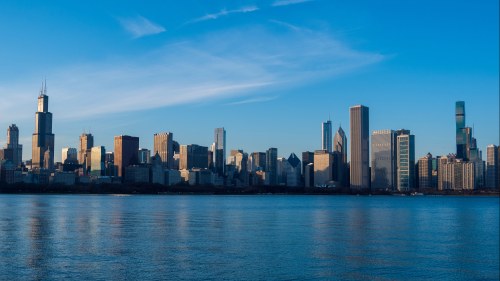Defining Chicago

Chicagoans may love to compare the city to New York, but Chicago occupies a second tier of global cities that are centers of learning, culture, and business.
If you live in Chicago, you’re probably familiar by now with the dust storm unleashed by Rachel Shteir, an expatriate New Yorker and heretofore obscure professor at the city’s DePaul University, who wrote a review of three Chicago-related books which led the New York Times Book Review on April 21. Actually, it wasn’t a review so much as an excuse for an essay by Shteir on the city and what‘s wrong with it. If you don’t live in Chicago, here’s the review.
The first paragraph will give some of the flavor:
“Poor Chicago,” a friend of mine recently said. Given the number of urban apocalypses here, I couldn’t tell which problem she was referring to. Is it the Cubs never winning? The abominable weather? Meter parking costing more than anywhere else in America…with the money flowing to a private company, thanks to the ex-mayor Richard M. Daley’s shortsighted 2008 deal…”
After a lot of this, she ends, “Chicago is not Detroit, not yet.” But the city’s boosterism, which she says “has bugged me since I moved here from New York 13 years ago,” exists “because the reality is too painful to look at. Poor Chicago, indeed.”
This has brought a torrent of comment, pro and con, mostly con.
Most agree that the problems she cites, from the Cubs to the parking meter deal to the city’s segregation and inner-city murder rate, are valid enough, but can be culled from any morning newspaper. They also agree that the essay tells more about Shteir, a homesick New Yorker who has never bothered to learn much about Chicago, than it does about the city itself, which is both more dynamic and more troubled than she seems to understand.
Some critics reacted with a civic outrage that tended to validate her scorn of the city’s boosterism. A few told her to get out of town. Others listed or exaggerated the city’s virtues. Surprisingly, there’s been little discussion of what the city really is, where it fits into the 21st century world, how it compares with New York and other cities, and how it should regard itself.
Shteir’s right, that Chicago “is not Detroit, not yet.” And it never will be: suggesting otherwise simply reveals her ignorance of both cities. But nor is Chicago New York, not yet. And never will be. Outraged Chicago chauvinists who insist that Chicago is quieter and more livable, that Chicagoans are more polite, that Chicago is a cheaper place to live, miss the point as badly as did Shteir.
Let’s face it, New York is a Great City in a way that Chicago never was nor will be. It’s one of the capitals of the universe, a center of finance, fads, fashion, and fascination up there with a handful of other Great Cities, such as London, Paris and Tokyo. Not that these are quiet or cheap places, polite or welcoming, or even pleasant places to be. Rather, they are truly where the action is, noisy and bumptious and busy, often too preoccupied with running the world to slow down for visitors from their hinterlands. They set the agenda and cultural standards of their countries. They’re often hard places to live. But they truly stand on the pinnacle of the global economy, of world scholarship and commerce, of civilization itself. Any city that presumes to be in their league has a lot to prove.
As most rankings of global cities confirm, Chicago is in the second tier, below the big four or five but in the top ten globally. That’s close enough to give us the illusion that, on our good days, we rank up there with New York. We don’t.
Chicago, in truth, is a first-rate provincial capital. That sounds like a put-down, but it isn’t. Roy Jenkins, the British scholar/politician, once wrote a book called “Twelve Cities,” in which he called Chicago “simply the greatest non-capital city in the world.” (New York, he said, was a capital city “in all but the strictly political sense.”) These capital cities are different, mostly because they house governments and generate political clout, in a way that a non-capital city doesn‘t.
A list of provincial capitals or great non-capitals includes some of the world’s best cities. Jenkins said that Chicago has “a unique mixture of vigor and sophistication” that is rivaled, among other non-capital cities, only by Toronto on this continent or Barcelona in Europe. Other great non-capitals that come to mind include Shanghai, Sydney, Johannesburg, Sao Paulo, Munich, Osaka, Mumbai, Hamburg, St. Petersburg, Frankfurt, Rio de Janeiro, Zurich, Amsterdam, Melbourne, Montreal, Istanbul, Milan, and many more.
That’s quite a roster. Most, such as Shanghai and Frankfurt, are centers of business. Some, such as Milan, are centers of fashion or culture. A few, such as Istanbul or Sydney, outshine their capital cities and dominate their nations. But most, like Chicago, are centers of sub-national regions and radiate regionally but not nationally.
Chicago has no business comparing itself to New York, and both its boosters and its Shteirs look foolish when they try. Rather, it should recognize that it belongs to a rather glittering global Hanseatic league, and should learn from the cities with which it has so much in common.
All these cities didn’t let their lack of political clout keep them from climbing the global pole. They manage to fit into a world where this political clout is elsewhere. They often are multi-faceted and multi-layered, most complex than the capitals, which (like Washington) are often one-industry towns. Many have great universities or boast orchestras or artistic climates that outshine their capitals.
Shteir’s little screed was a shoddy product, but if it ignites a civic debate on Chicago’s true place in the world, it might have served its purpose.

